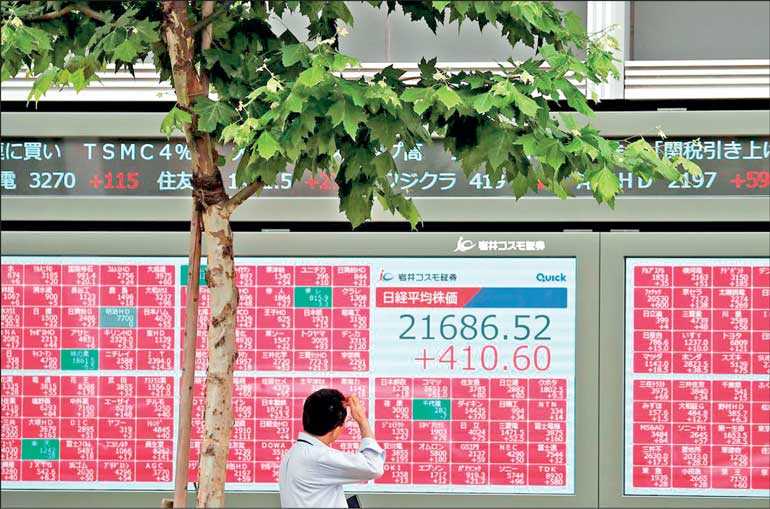Wednesday Feb 25, 2026
Wednesday Feb 25, 2026
Friday, 19 July 2019 00:00 - - {{hitsCtrl.values.hits}}

TOKYO (Reuters): Asian shares wobbled in early Thursday trading as Wall Street stocks dropped on early signs that the US-China trade war could hurt corporate earnings, helping to underpin solid demand for safe-haven US Treasuries.
MSCI’s broadest index of Asia-Pacific shares outside Japan was down a touch, while Japan’s benchmark Nikkei fell 1.3% and Australian shares dropped 0.4%.
South Korea’s market was off 0.4%. Moments earlier, the Bank of Korea unexpectedly cut its policy interest rate for the first time in three years, as uncertainties from a trade dispute with Japan added to anxiety about the economy’s outlook.
On Wall Street, all three major indexes fell on Wednesday as weak results from trade-related CSX Corp stoked concerns that the protracted trade standoff between the United States and China could hurt US corporate earnings.
Earlier in the week, US President Donald Trump kept up the pressure on Beijing with a threat to put tariffs on another $ 325 billion of Chinese goods, amid market nervousness over when face-to-face talks will resume.
The Wall Street Journal reported that progress toward a US-China trade deal has stalled while the Trump administration determines how to address Beijing’s demands that it ease restrictions on Huawei Technologies.
The Dow Jones Industrial Average fell 0.4%, the S&P 500 lost 0.7% and the Nasdaq Composite dropped 0.5%.
Netflix Inc. shares tumbled in aftermarket trade after the world’s dominant subscription video service lost US streaming customers for the first time in eight years and missed targets for new subscribers overseas, raising worries in an already nervous the market.
“As we enter the third quarter, we are in a finely balanced position epitomised by an overly pessimistic bond market on the one hand, and an optimistic equity market on the other. We think we are somewhere in between those views,” said Paras Anand, head of asset management for Asia Pacific at Fidelity International.
Indeed, Treasury yields fell as concerns about the US-China trade war boosted demand for safe haven debt and after data showed weakness in the US housing market.
Yields on benchmark 10-year and 30-year bonds climbed more than seven basis points each, to 2.06% and 2.57%, respectively.
US homebuilding fell for a second straight month in June and permits dropped to a two-year low, suggesting the housing market continued to struggle despite declining mortgage rates.
In the foreign exchange market, the dollar nursed light losses on Thursday, weighed down by lower US yields and a rebound by the pound from 27-month lows.
The International Monetary Fund (IMF) on Wednesday said the dollar was overvalued by 6% to 12%, based on near-term economic fundamentals.
The dollar index versus a basket of six major currencies was nearly flat at 97.119 after shedding 0.2% the previous day.
The euro was not much changed at $ 1.1285 after crawling up 0.1% on Wednesday. The greenback fell 0.3% to 107.660 yen, extending an overnight loss of 0.3%.
Sterling was steady at $ 1.2433. It had stumbled to $ 1.2382 overnight, its lowest level since April 2017 on concerns of a no-deal Brexit.
Precious metals were in demand. Gold prices rose more than 1% on Wednesday as weaker-than-expected US data reinforced expectations for an interest rate cut by the US Federal Reserve later this month, dragging the dollar lower.
Spot gold was 1.2% higher to finish at $ 1,426.60 per ounce. It last stood $ 1,427.22 per ounce.
Silver soared about 2.5% on Wednesday to hit a more than four-month high of $ 15.96, extending gains for a fourth straight session. The metal was last quoted at $ 16.06.
Oil futures fell on Thursday, pushing losses for a fourth straight session after US government data showed large builds in refined product stockpiles.
Brent crude futures were down 0.1% to $ 63.62 a barrel, while US West Texas Intermediate (WTI) crude futures fell 0.3% to $ 56.61 a barrel.